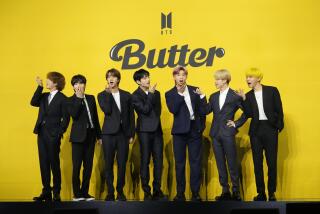SGN buys game development studios Fat Rascal and Kiwi

SGN co-founder and Chief Executive Chris DeWolfe prefers acqusitions as a strategy to expand his company.
Former Myspace Chief Executive Chris DeWolfe and his mobile game company SGN are on a buying spree. The goal: become a mobile-games giant as the crowded industry inevitably consolidates.
SGN announced Wednesday the acquisition of Fat Rascal Games Inc. and Kiwi Inc. in what looks to be the Culver City company’s first set of increasingly bigger purchases of other development studios. Terms of the deals were not disclosed.
With so many games in app stores, making money on smartphones and tablets is tough. Mobile games are usually free to play, so developers must amass huge user bases because only a tiny percentage pay for digital goods inside the apps, where the real money is. If a game takes off, the reward can be huge, with profit margins of 20% to 40%.
But development and marketing costs are skyrocketing as users demand higher-quality games and hundreds of new options launch each week. Early success and timely capital infusions have left a few developers with much-needed cash, including SGN and other California companies such as Machine Zone Inc., Glu Mobile Inc. and Kabam Inc. The gaming arms of Warner Bros. and Walt Disney Co. have ready access to cash, if the corporate overlords deem them worthy.
SGN expects about $300 million in revenue this year and is considering an initial public offering in the next couple of years. But longevity requires a bolder strategy, and DeWolfe’s preference is to grow through acquisitions.
He said in an interview that he expects over the next decade that about 10 companies will control nearly all of revenue from mobile games, meaning companies outside that list will find it “tough to compete.” Investment bank Digi-Capital expects global mobile gaming revenues to reach $45 billion by 2018.
To land in the top 10, “you need a very big portfolio of games,” DeWolfe said. SGN, known for “Cookie Jam” and “Panda Pop,” plans to release five new ones in 2016, and DeWolfe is banking on at least four of them to be “commercial successes.”
“In the interest of consolidating the market and growing very quickly, we need to make things go more quickly and deploy some dollars to buy companies,” he said.
Josh Burns, an independent consultant to mobile game makers, said SGN’s strategy makes sense.
“If you don’t have capital to scale your products through marketing or already have a built-in audience, it’s very challenging out there,” he said. “You have a lot of companies struggling right now.”
One of those was Kiwi, which sold seven of its games to RockYou this summer after a strategy shift didn’t pan out. Kiwi’s focus on games for the Android operating system helped it take off and raise $15 million from investors. But “as more developers entered the market, it was difficult for them” to get traction with additional games, Burns said.
Now, Kiwi’s expertise in games in which time limits or building objectives play key roles can help move SGN into new territory — puzzle games are SGN’s forte.
DeWolfe declined to comment on specific projects but said Kiwi and Fat Rascal would develop new games in their areas of strength.
Seattle-based Fat Rascal brings with it 15 employees who SGN said have “decades of experience.”
Palo Alto-based Kiwi adds 25 employees to SGN’s existing workforce of 250.
A $130-million investment from South Korean gaming company Netmarble is funding SGN’s latest purchasing push. With earlier funding, SGN bought four companies, including San Diego-based Mob Science, which then came up with “Cookie Jam.”
SGN could grow through investments, partnerships or expanding hiring too, of course. Competitors such as Culver City’s Scopley Inc. and many Asian companies take those routes. But DeWolfe prefers scooping up existing development teams because their knowledge of one another’s strengths and weaknesses help deliver projects faster.
That adds a management challenge, though, as different companies with different cultures team up to meet corporate objectives. SGN plans to counteract that with quarterly-or-so summits for employees across the world to share lessons with one another.
SGN’s moves go against the tide in the video game industry. Spending on mergers and acquisitions was down 75% this year through September compared with the same period last year, according to Digi-Capital. Even after Activision Blizzard Inc. last month purchased “Candy Crush” maker King Digital Entertainment for $5.9 billion, analysts were skeptical that deal activity would pick up because of the lack of interesting sellers.
But Burns offered one reason why deals might pick up: Companies are desperate for more users from outside their own regions as growth slows at home. South Korea’s Netmarble invested in SGN so it could have a gateway to the Americas and Europe. And China’s Tencent and Alibaba have poured billions of dollars into U.S. and European gaming companies.
Twitter: @peard33







